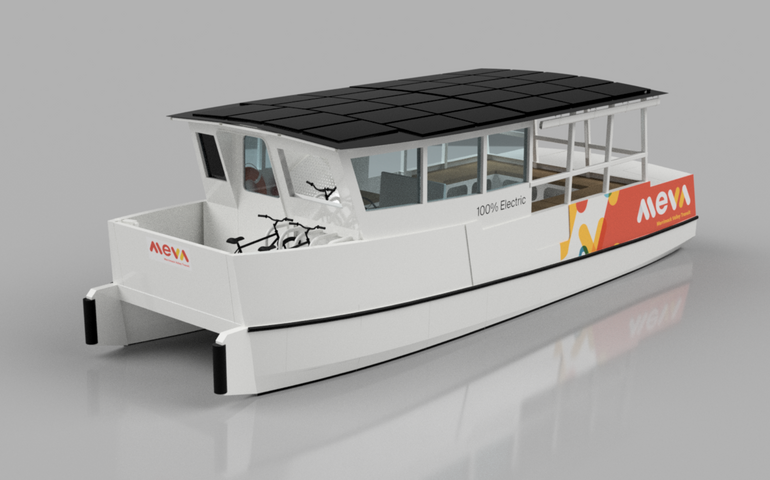Thomaston boatbuilder to produce solar-powered ferries for Bay Street transit operator
 Rendering / Courtesy Lyman-Morse
The 33-foot catamaran will be powered by two electric outboard motors, with onboard batteries supplemented by topside solar panels.
Rendering / Courtesy Lyman-Morse
The 33-foot catamaran will be powered by two electric outboard motors, with onboard batteries supplemented by topside solar panels.
Lyman-Morse, a Thomaston boatbuilder, was tapped by a Massachusetts transit operator to design and produce three solar-powered ferries.
Since the company’s founding in 1978, Lyman-Morse has grown to include several interrelated lines of business, including boatbuilding, marine service, marina operations, yacht brokerage and fabrication. Yacht production includes carbon-fiber ocean racers, cold-molded wooden sailboats and motorboats.
Solar assist
The firm’s workboat division was selected for the Merrimack Valley Transit ferry commission through a competitive process that considered not just price but also overall design, materials and performance, according to a news release.
Merrimack Valley Transit operates a public bus service in the Merrimack Valley region of Massachusetts.
The ferries, funded through a $4.2 million federal grant, will bring commuter and recreational ferry service back to the Merrimack River for the first time in nearly a century.
The job combines precision marine engineering and sustainable technology, said Jonathan Egan, director of the Lyman-Morse workboats division.
Lyman-Morse will produce three aluminum-hulled, solar-assisted electric ferries built in partnership with William Lincoln of Newburyport, Mass.-based Response Marine, whose specialties include aluminum watercraft design.
Evoy Vita Power, based in Flora, Norway, will supply the advanced electric-propulsion system.
Each ferry will be a 33-foot catamaran and will accommodate 18 to 22 passengers and crew, with additional space for two bicycles or scooters.
Onboard batteries
Each will be powered by two 120-horsepower electric outboard motors. The vessels are expected to cruise comfortably at 10 to 12 knots.
There will be onboard batteries that will be supplemented by solar roof panels. The batteries will be able to get quick power boosts between trips, thanks to fast-charging stations located at both ends of the crossing.
The ferries will have flush decks for wheelchair and mobility access. The first vessel is expected to begin demonstration trips in 2026, with full ferry service projected to launch in 2027. The route will run east-west on the Merrimac River, providing morning and evening commuter trips and midday recreational runs. Bus routes will be coordinated to meet the ferries.
“This project represents exactly what we stand for at Lyman-Morse,” said Drew Lyman, president of Lyman-Morse. “It’s a blend of innovation, design excellence and environmental stewardship.”
The commission follows another electric boat project several years ago, when Lyman-Morse teamed with Navier Boat, a San Francisco technology startup, to build an all-electric boat.














0 Comments